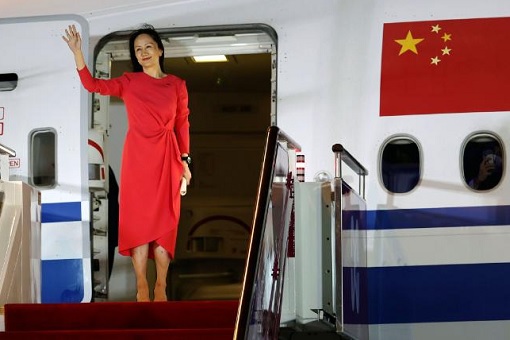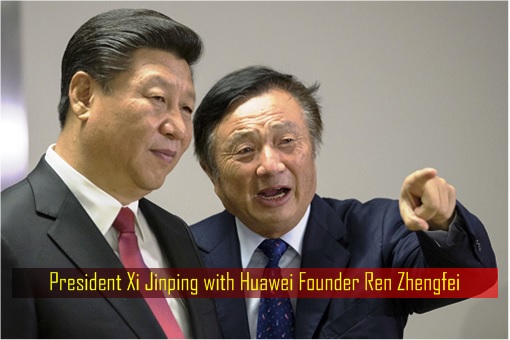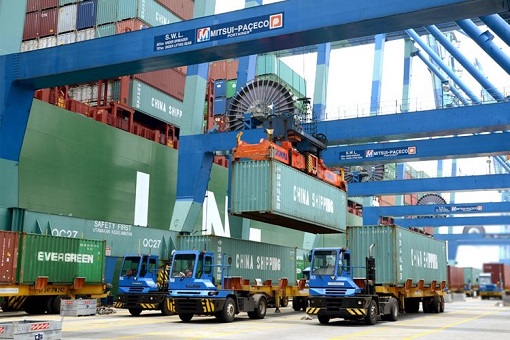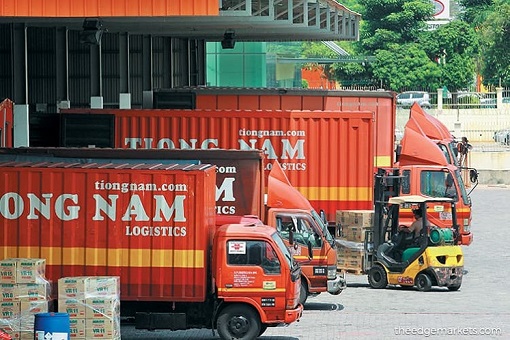When Sabrina Meng Wanzhou, the CFO of Huawei Technologies and the daughter of Huawei founder Ren Zhengfei, was finally on her way back home to China on a charter flight arranged by the Chinese government , she could not control her emotion. After all, she had been detained for almost 3 years, despite living in her US$10 million seven-bedroom mansion.
Her plane was deliberately flown over the Arctic, avoiding the U.S. Alaskan airspace over fears that it may be diverted to the US. It didn’t take long for the Princess of Huawei to post a long message on WeChat, describing how she sobbed uncontrollably as he headed for home. When she said home, it was not just her family and mansion, but her country she called “motherland”.
On board the plane, she expressed her pride of her motherland – China – as the blinking lights on the Air China 777’s wings continued in the darkening skies as the flight avoided the American airspace – “This moment I’m soaring over the Arctic towards home, soon to fall into the mother’s embrace of my ancestral country. After three years, my motherland is within reach.”

Describing China and Communist Party of China as the shining light that has lit up “the darkest moments” of her life, she wrote – “Under the leadership of the Communist Party of China, my home country is becoming stronger and more prosperous day by day. Without a strong motherland, I won’t have my freedom today. We live in a peaceful time and were born in a great country.”
She eventually landed safely at the Bao’an International Airport in Shenzhen, home to Huawei headquarters. Wearing a red dress, matching the color of China’s flag, Meng thanked the ruling Communist Party and its leader Xi Jinping for supporting her through more than 1,000 days in house arrest in Vancouver. Meng’s episode has increased nationalism across the country.
Beijing has sent a message that any country that kidnaps one of its citizens would end up with two of their citizens being kidnapped in retaliation. More importantly, China has shown its rise as a global economic and political power. It would not allow foreign governments bully its own people, and would do anything to protect its national assets like Huawei, one of its crown jewels.

But it’s a totally different story in Malaysia. Every now and then, the government would complain about the lack of patriotism and nationalism. They would force people to fly the national flag, not realizing that true patriotism cannot be forced or bought. At the same time, the corrupt and racist government will spew anti-Chinese or anti-Hindu sentiment to rally for Malay support.
Instead of retaining and nurturing talents, the Malaysian government would try their best to reject the top brains. The major reason the country is still battling the Covid-19 pandemic since 2020, despite having a bloated Cabinet of 73 ministers and deputy ministers, is because the quality of leaders has deteriorated from bad to worst. Their incompetence is beyond words.
Even if the current government eventually managed to vaccinate 100% of the people, the elephant in the room is the economy. Thanks to the previous clueless Muhyiddin backdoor government, the country is in a very bad shape due to Coronavirus mishandling and economic mismanagement. The return of the previous highly corrupt UMNO government will only make it worse.

Not only United Malays National Organization (UMNO), the dominant political party of Barisan Nasional coalition that had ruled for 61 years since independence in 1957 until its stunning defeat for the first time in the May 2018 General Election, has done an incredible job in draining top brains, it has also consistently robbing local Chinese companies using racist policies.
Yes, for decades, racist and discrimination policy like the NEP (New Economic Policy) derived from “Ketuanan Melayu”, the ideology of Malay supremacy espoused by UMNO, has seen brain drain in the form of hundreds of thousands of technical skills went through a large scale migration to other countries. But the racist policy is not only applicable to intellectual skills.
Local business community, especially non-Malay, has been subject to the unfair policy of having to surrender 30% stake of their business to the so-called Bumiputera (sons of the soil). But as exposed by the frustrated Federation of Malaysian Freight Forwarders (FMFF) days ago, the 30% requirement is already outdated. Now, they want 51% stake of your companies – clearly a daylight robbery.

In a letter dated Sept 18 addressed to Senior Minister Azmin Ali, who is International Trade and Industries minister, FMFF president Alvin Chua said – “If local logistics companies are compelled to sell a majority share to Bumiputera investors, it means the government is telling us to sell our business to a Bumiputra or close down.”
By forcing non-Malays to give up 51% of their business, it simply means the owners (mostly Chinese), who have been working very hard for decades building their businesses, can no longer control and run their companies. This is like surrendering 51% of your properties and treasures to the pirates, and at the same time making the pirates your new boss, who knows nuts about business.
Apparently, local freight forwarders registered before 1976 did not have a Bumiputera requirement. However licences registered between 1976 and 1990 require a 30% Bumiputera equity, while companies registered after 1990s must surrender 51% stake to Bumiputera. Strangely, integrated international logistics service providers (IILS) are exempted of such unfair regulation.

Unlike China, who protect local business owners (like Huawei) more than foreign business owners, it’s upside-down in Malaysia. The UMNO-Malay government actually protects foreign businesses while bullying – even robbing – local businesses. This demonstrates not only discrimination, racism and greed, but also pathetic cowardice by “kowtowing” to foreign companies.
Even though the 51% Bumiputera ownership requirement has deferred to the end of next year, largely because the current weak government is struggling to find its footing, eventually the local logistics companies will lose their shares. Either they continue working like a slave to enrich their new masters after giving up majority stakes, or they close down, creating unemployment.
Exactly why the Bumiputeras can’t build their own logistic companies, but must steal from the Chinese or Indians? Even if the Chinese give up 100% of the stakes to the Bumiputera, do you think they can successfully run the companies when they do not know the nuts and bolts of the business? Instead of promoting meritocracy, the government continues its policy of endless robberies.

It’s not hard to understand why the Bumiputeras, or rather UMNO-Malay, do not have the capability to build – and more importantly sustain – their own logistic companies, but must steal from others. You don’t need to look far, but Prime Minister Ismail Sabri, the same racist man who defended a mobile phone theft at Low Yat Plaza in 2015, just because the thief was of Malay ethnicity.
He was also the same man who, in the 2018 General Election, waved the racial card, warning that every vote for the Opposition was akin to eliminating special privileges given to Malays under the decades-old “Ketuanan Melayu”. The turtle-egg man later started “Low Yat 2” to empower Malay vendors after the racial riots at IT Mall Low Yat, only to see those half-baked tech malls shut down one after another.
Mara Digital Mall Kuantan was closed in 2018 while Mara Digital Mall Johor ceased operations in 2019. The best part was both malls were closed down within just 3 months. Even the Kuala Lumpur outlet, despite its location in the heart of the city, has been struggling for years. Instead of selling gadgets and IT equipments, vendors were reduced to selling potato chips.

If they can’t even do something as easy as selling IT gadgets, chances are they would be annihilated in the extremely competitive and complicated logistics sector. But the complaint lodged by the Federation of Malaysian Freight Forwarders (FMFF) is just the tip of the iceberg. Other sectors could suffer from the same racist policy, affecting the potential growth of local businesses.
Some gullible and ignorant Malays might agree with the racist policy, not realizing that it would create cronyism where politicians like Azmin Ali – not ordinary Malays – would grab the stakes and become billionaires over time. That was how UMNO warlords became extremely wealthy, while average Malays were suffering – even have to raise white flags – during the Covid-19 pandemic.
The endless “Ketuanan Melayu” policy is the reason local companies like Grab have relocated or shifted their headquarters to neighbouring countries, especially Singapore. And the local freight forwarding companies can do the same to avoid giving up 51% to the Bumiputera pirates and parasites. It would be a loss to the country, which UMNO still hasn’t figured out.

Grab was originally started by two Harvard Business School classmates – Anthony Tan and Tan Hooi Ling – in Malaysia, kicked off as MyTeksi in 2012. But the founders also realized that in Malaysia, they must get ready to give 30% (or more) of company shares to Bumiputera. To make matters worse, the country does not provide a conducive environment for business.
Grab had tried to apply for financial grants from Khazanah Nasional, the sovereign wealth fund of the government of Malaysia. But the long process and Khazanah’s disagreement to the deal saw Singapore government investment fund Temasek quickly grabbed the opportunity, pumping US$10 million into Grab in 2014 – another example of how Malaysian talents are lost to foreign countries.
Thanks to regulatory issues, racist policies and bureaucracy in doing business in Malaysia, Anthony Tan and Tan Hooi Ling moved the company headquarters from Malaysia to Singapore, and rebranded the business as GrabTaxi. Singapore provides a strong legal framework in addition to sound financial regulatory environment for investors – something that Malaysia could not offer.

In April, Grab Holdings announced its plan to go public in the United States, which values the Southeast Asian ride-hailing and food delivery giant at a mind-boggling US$39.6 billion in market capitalization, making it Southeast Asia’s most valuable tech unicorn. It was supposed to be a Malaysian company, but the founders moved to Singapore instead.
Phison Electronics Corporation could have been a Malaysian company too, if not for the endless racist policy. Sekinchan-born Pua Khein Seng, known as “father of pendrive” in Malaysia, was responsible for the invention of the world’s first single-chip USB flash drive controller, which was released in June 2001. After completing his studies at Pin Hwa High School, he failed to get a place in Malaysian public universities.
Pua was forced to continue his studies at Chiao Tung University, Taiwan, majoring in Electrical and Control Engineering. He had to work part-time during his three years studying in Taiwan to pay his way through university. At the age of just 27, he founded Phison Electronics in November 2000 after completing his studies, and introduced a pendrive with 1GB capacity in September 2001.

In April, 2002, Phison established strategic cooperation with System and Toshiba. In 2020, the supplier of NAND flash memory controllers and modules reported an increase of revenue of 23% to NT$47.56 billion (US$1.68 billion) from NT$38.64 billion. Last year, the company made it to Bloomberg Businessweek’s Tech 100 List of Top Performing Tech Companies.
Other Articles That May Interest You …
- Only In Malaysia – PM Najib Stole People’s Money, Spy Chief Stole His Money, Anti-Corruption Officers Stole Her Money
- Driving Investors Away – Prolonging Covid-19 Pandemic In Malaysia Threatens Global Semiconductor Supply Chain
- Karma!! – Muhyiddin Cries & Lies Even After Resign, From Plotting With Crooks To Killing 13000 People To Achieving 0% GDP
- A $40 Billion Listing – How Two Malaysians Moved Grab To Singapore And Grow It As Southeast Asia’s Most Valuable Startup
- The Worst Is Yet To Come – Muhyiddin’s Mishandling Of Covid-19 & Mismanagement Of Economy Is Worse Than Trump
- Get Ready For Bad Time Ahead! – As Malaysia’s Economy & Corporate Debt Get Worse, Retrenchment Has Just Begun
- Meet Eric Yuan & His Inspiring Story – The CEO & Founder Of Zoom Who Got $6.6 Billion Richer In Just 24 Hours
- Meet Malaysian-Born Cassandra Hsiao – Her Essay Got Her Into All 8 Ivy League Uni
- Meet Singapore New Richest Man, Who Never Went To School
- Meet Millionaire Cheong Choon Ng – The Rainbow Loom Inventor Who Was Denied Local “Uni”, Due To Malaysia Racist Policy

|
|
September 26th, 2021 by financetwitter
|


|

|

|

|

|

|




























Comments
Add your comment now.
Leave a Reply